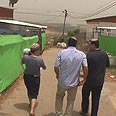
Settlers: Our life has become a wreck
Five years after Sasson Report, not even one of 24 outposts defined illegal has been evacuated, but settlers say its criteria have led to secret building freeze policy
"Ever since the 'extermination report', the reality we knew has changed unrecognizably. From house owners we've turned into lawbreakers," one of them says.
The outpost residents explain that during this period, the State which sent them to live in those territories has stopped providing basic infrastructures like electricity, sewage systems, and telephone connections. At the same time, they point to a "secret freeze", which they view as even more severe than the temporary settlement construction freeze which began six months ago.
The Sasson Report was prepared by Attorney Talia Sasson, the former head of the State Prosecution Criminal Department, at the request of former Prime Minister Ariel Sharon following the government's decision to adopt the Road Map peace plan, in which Israel committed to dismantling all the illegal settlements built since March 2001.
The report pointed to 24 such outposts, most of which are located – fully or partially – on private Palestinian land. To this day, not one of these outposts has been fully evacuated.
However, the criteria set by the report defined an "outpost" as a community built without an authorized city building plan signed by a government representative (in the territories it would be the command chief or the defense minister).
This is the settlers' main point of criticism against the report, which makes most of the settlements – including many communities within the Green Line – illegal. But the enforcement, they say, is selective.
"There are dozens of communities in Israel without a signed city building plan," says Shomron Regional Council head Gershon Mesika. "Only in the territories the State applies a different law, because it is afraid of dealing with the political ramifications of making the communities legal."
The Left claims, on the other hand, that despite the report the outposts have only been entrenching themselves deeper into the land. "They continue to build and couldn't care less about the law," says a Yesh Din official.
In the outposts themselves, the main concern is for immediate needs. "We build extensions in order to allow our children to be educated in kindergartens, just like anywhere else in the country," says a mother from the settlement of Bruchin.
"The children study inside shattered and neglected caravans because the State, which on one hand gives us budgets to build education institutions, won't let us build them on the other hand – because we are 'illegal'. Someone up there has decided to stop the settlement enterprise without taking the damage caused to us, the residents, into account."
The Defense Ministry said in response, "Resources can be invested in recognized communities, with a community symbol. According to the legal advisor's instructions, ministries must avoid investing any resources in unauthorized outposts."










